|
Lots of people reached out to me over the past few days asking for some advice and insight on how to support their grieving teens after the sudden and tragic death of their peer. Sadly, teens in my own town are not the only ones who are or will face the challenges of grieving while being a teenager.
Rather than keep my suggestions hidden within some texts and dms, here are some tips and strategies for parents who are trying to navigate their way through the heartbreaking maze of supporting their grieving teen after a loss. While this list is certainly not exhaustive, my hope is that it offers some tangible tools for anyone who loves a grieving teen. 𝟏. 𝐍𝐨 𝐓𝐰𝐨 𝐓𝐞𝐞𝐧𝐬 𝐆𝐫𝐢𝐞𝐯𝐞 𝐀𝐥𝐢𝐤𝐞 Teen grief, like much of adolescence, is messy, unpredictable, and very unique. There is no one-size-fits-all approach when it comes to supporting grieving teens. So it’s most important to tune into your own teen. Who are they? What do they need? How have they typically handled difficult times in the past? What are they asking for right now (both in words and in actions)? 𝟐. 𝐑𝐞𝐬𝐢𝐬𝐭 𝐓𝐡𝐞 𝐓𝐞𝐦𝐩𝐭𝐚𝐭𝐢𝐨𝐧 𝐓𝐨 𝐂𝐨𝐦𝐩𝐚𝐫𝐞 One of the most hurtful things our society does in times of grief is to begin comparing and ranking people’s grief. Who was closest? Who knew them best? Who knew them the longest? Who is most impacted by the loss? The problem with this approach is that it can marginalize, disenfranchise, and minimize some grievers. This approach to grief tends to happen on an even larger scale with teens because so much of their existence as a teen takes place within the context of their relationship to others. Watch out for signs of this beginning to unfold. Just because your teen might not have been on the same sports team or didn’t sit next to them on the bus or didn’t take photos with them at homecoming, it doesn’t mean their grief is any less real or valid. A number of factors impact someone’s grief experience and closeness of the relationship is only one small fraction. Make sure your teen knows their grief is ok - no matter what other people may think or how close people may have thought they were. 𝟑. 𝐑𝐞𝐠𝐫𝐞𝐭 Let’s face it, all teens make mistakes at some point. They say hurtful things. They do hurtful things. They end friendships. They put their attention somewhere else. Your teen may have some regret about their relationship with the person who died. Create space to talk about that so they don’t carry around silent guilt and shame. 𝟒. 𝐁𝐞 𝐒𝐦𝐚𝐫𝐭 𝐀𝐛𝐨𝐮𝐭 𝐒𝐨𝐜𝐢𝐚𝐥 𝐌𝐞𝐝𝐢𝐚 Social media can provide a healthy way for teens to connect with and publicly share their grief - but it can also be a place where negativity, blame, judgment, and competition can fester. Remind your teen that hurtful words they may see online are so often just an outward expression of someone else’s pain. Help them to set some boundaries on social media and create space for them to share with you the overall tone of what they are seeing. 𝟓. 𝐎𝐩𝐞𝐧 𝐂𝐨𝐦𝐦𝐮𝐧𝐢𝐜𝐚𝐭𝐢𝐨𝐧 Check in with your teen often - not just about grief - but about everything they are facing during the grieving process and remind them you are always available to talk about it. This is a tough line to walk because you don’t want to push the topic with them and you don’t want to give the impression that you don’t want to talk about it - but it’s important to try and find balance. Taking a drive in a car with them can often be a good place to talk as it takes away the pressure of eye contact. A walk or hike with them can provide the same result. For some teens, their primary mode of communication is with their phone. Don’t be afraid to send them a text or Snap to check in too. It may be easier for them to type out their thoughts and feelings instead of speaking them verbally. 𝟔. 𝐄𝐧𝐜𝐨𝐮𝐫𝐚𝐠𝐞 𝐂𝐨𝐦𝐦𝐮𝐧𝐚𝐥 𝐆𝐫𝐢𝐞𝐯𝐢𝐧𝐠 The act of coming together publicly with other people can be an extremely important part of the grieving process. It validates and normalizes teens’ feelings and can help them to feel connected with others. Foster and encourage gatherings with friends and peers. Encourage them to make those events even more personal and individual by having them write private notes or thoughts to their lost peer. It’s ok to have multiple gatherings. It’s also ok for your teen to decide to not participate. 𝟕. 𝐃𝐨𝐧’𝐭 𝐒𝐡𝐲 𝐀𝐰𝐚𝐲 𝐅𝐫𝐨𝐦 𝐓𝐡𝐞 𝐇𝐚𝐫𝐝 𝐐𝐮𝐞𝐬𝐭𝐢𝐨𝐧𝐬 Death can create a lot of tough questions for teens about death and what happens after. They may ask specifics about the body and different funeral practices. Because teens are very much egocentric by design (it’s a good thing) they may also be curious about what would happen in the event of their own death. I know we don’t want to think about or talk about that but if they bring it up it;s best to try not to shy away from those conversations. It’s also normal for teens to have questions about what would happen in the event of your own death. Let them guide the conversation if they bring it up and answer their questions honestly without providing more info than what they have asked for. 𝟖. 𝐌𝐞𝐧𝐭𝐚𝐥 𝐇𝐞𝐚𝐥𝐭𝐡 𝐒𝐮𝐩𝐩𝐨𝐫𝐭 The death of a peer always creates an important opportunity to discuss mental health. Remind your teen that there may be many people in their own peer group who struggle with mental health and the period after a death may be especially challenging for them. Having conversations about mental health can help to prevent grieving teens from feeling judged and misunderstood. Talk about the resources available for teens and make a plan with your teen for who they would talk to if they need support. If they are open to it, this might be a good time to set them up with a therapist as a way to process their feelings and to have a safe outlet for their grief. 𝟗. 𝐒𝐞𝐥𝐟 𝐂𝐚𝐫𝐞 One of the hardest parts of parenting exists in those spaces where our children are hurting and we can’t take away their pain. Watching your teen grieve will probably break your heart. But don’t be surprised if you find yourself grieving too. This journey of parenthood brings many other children into our lives and sometimes we become very attached to and bonded to some of those children. Additionally, losing a child is a parent’s worst nightmare and it’s normal and natural to put yourself into someone else’s shoes. Give yourself space and permission to grieve as well. Your grief is just as real as your teen’s grief. 𝟏𝟎. 𝐑𝐨𝐮𝐭𝐢𝐧𝐞 𝐚𝐧𝐝 𝐅𝐥𝐞𝐱𝐢𝐛𝐢𝐥𝐢𝐭𝐲 For many children, teens, and adults, routine can be comforting after a loss. Things like school, work, and sports can provide a welcome distraction for many teens. Be sure they have what I call an escape plan - a way to take a break from the routine when a wave of grief hits. Things like being able to go for a walk or make a phone call or sit and journal can be important for grieving teens when they need a break from their routine. Similarly, an escape plan is a good tool to have during things like wakes, funerals, and memorial services. It’s ok if a teen thinks they can and want to attend but then realizes mid service that they don’t want to be there. Let them have a voice. Also be aware the grief can come in waves. So one minute your teen may be sobbing on the bathroom floor and the next they may be giggling with friends. It’s normal for teens to not always “look” like they are grieving. 𝟏𝟏. 𝐁𝐨𝐨𝐤𝐬 𝐚𝐧𝐝 𝐉𝐨𝐮𝐫𝐧𝐚𝐥𝐬 I tend to steer away from making a blanket recommendation for teens when it comes to books on grief. For some teens, books and podcasts and prompted journals can be helpful. For others, they would never use them. Stop by a bookstore or an online marketplace like Amazon and browse through the “teen grief” books and journals. Read the reviews and flip through the books and their descriptions. You know your teen - if you find one that seems like them then maybe tell them about it and leave it by their bedside. 𝟏𝟐. 𝐑𝐞𝐠𝐫𝐢𝐞𝐟 One thing that is different when it comes to grief in children and teens vs adults is the concept of regrieving. As children and teens move through all of the developmental shifts and stages in life, they can often grieve a loss over and over again as they come to understand the loss in a new way. So often that regrieving can be as intense as the first time. So don’t be surprised if your teen seems to be doing better for a bit and then suddenly is broken hearted again. The support they need while regrieving is the same as during the initial loss. Be on the lookout for grief to spike again around birthdays, anniversaries, holidays, and big school events (i.e. proms, graduations, homecoming, last day of school) as they continue to realize the impact of the loss of their peer. Bearing witness to our teens’ grief is one of the most challenging aspects of parenting. I wish I could tell you there is a magical solution that will make it easier, help to ease the pain of our teens, and heal their broken hearts quickly but there isn’t one. The reality is that when your teen experiences the loss of a peer you and your community are suddenly riding a giant wave of grief. You need to hold on tight, reach out for support, offer support and guidance where you can, and remember that it won’t always feel this hard. But for now, keep holding on and keep reaching out. No one is alone in this.
0 Comments
There is something beautiful that happens when someone loses a parent in our society. The people that love them most show up to grieve together and to wrap the grievers in love.
Meal trains get coordinated. Thoughtful cards are delivered. Supportive texts get sent. Meaningful care packages are left on doorsteps. Friendly faces make visits to wakes and funerals. People even check in on birthdays and holidays to make sure loved ones are OK. Each time it happens, I am moved by the beauty of this support. My hope and faith in humanity gets a boost. But selfishly, my own heart breaks a bit. Because when you finally make the brave decision to end an unhealthy, abusive, or toxic relationship with your own parents while they are still living, you find the pain of that loss is a lonely experience. There are no funerals or wakes where friends and family can mourn with you. There is nothing to contribute to the conversations with friends when they talk about the challenges of caring for aging parents. There is no way to convey the envy that sets in when grandparents of other children fill the basketball stands at your children’s games. There are no words to justify to someone who (in a well-intended manner) asks, “What if you regret it and it’s too late?” And there is no easy explanation to provide on why you hate your own birthday so much each year. There is no permission to share with others that a parent’s birthday or anniversary might be a hard time for you. And there is no comfort to be found when people start talking about their holiday plans with their families. There is no way to explain the odd jealousy that creeps in when a friend has the bittersweet experience of saying goodbye to a loving parent on their deathbed. While walking away from an toxic relationship with your parents can bring peace, comfort, and healing, often it also brings silence from those around you. Deafening silence. No one knows what to say so often nothing gets said at all. But the pain and the need to grieve is there because it is an ending. And the ending of any parent-child relationship is just like a death. It is the death of any hope of a healthy future relationship with your parents. The death of any possibility for reconciliation and repair. The death of ever knowing unconditional love from a parent. Yes, there is death even when there is no death. But there is no space for grief. Not for people like me. ***** Originally published September 2022 by Filter Free Parents HERE. Do you ever have one of "those" days?
I had one yesterday. Within seconds of my alarm going off, I found no less than 3 text messages that would change the course of my day. People needed my help. People needed my flexibility. People needed my permission. People needed my compassion. And within minutes, I was empty - before my feet had even hit the floor. What do you do on days like that? How do you move forward when it feels like life just keeps trying to knock you down? First I tried to push back. Then I tried to find hope. Next I tried to center and ground myself. Eventually I was able to change my own perspective and forced myself to find the positives amidst all the negatives. And then, as soon as I was able to do so, I gave myself some grace. I let myself curl up on my sofa and sit in silence. I let myself take care of me. And as I fell asleep last night, I reminded myself that tomorrow would be a new day and a new chance to start again. Sending you this reminder that if today is one of "those" days for you too, tomorrow is a new day. If you are hurting this week, I have a message just for you...
Some days it’s hard to find gratitude. Some days it’s hard to be thankful. Some days it’s hard to feel joy. Some days you are lonely, even when you are surrounded by others. Some days your heartache is so loud that it drowns out everything else good in your life. Some days all you can do is hope that others won’t notice the pain behind your fake smile. If today is one of those days, take a deep breath and fill your lungs with air. Feel your heart beat within your chest. Remember that you are still alive. Give yourself a tight squeeze and whisper to yourself - “it won’t always be this hard.” Find a glimmer of hope on the horizon, something to walk towards, something that just might bring you joy, something that just might make you thankful, something that just might help you find gratitude… someday. It won’t always be this hard. And for now, lean in to the things that bring you some comfort. For me, it’s my fur babies, a cozy blanket, and a hot cup of tea. “Schmerz.”
Have you ever felt it? Have you ever experienced grief so deeply that you feel it not just emotionally but across all your senses? You feel the pain in your body. Your heart feels heavy inside your chest. Your legs feel like they are slogging through thick mud. Sounds, smells, textures, lights - they all hurt and overwhelm you. Everything hurts. Schmerz. When translated, this German word for grief is a word used to describe ALL facets of pain - not just the physical sense. Grief is schmerz. Grief is pain - in all forms. Of course it is. Grief is more than just sadness. It is pain like nothing else. It cuts you to the core, turns your life upside down, and makes so many days feel impossible. When you lose someone, schmerz is something you carry with you always. Sometimes the weight of it is crushing. Sometimes the weight feels light like a pebble - just a palpable reminder. Either way, grief is a constant companion - and so is schmerz. In the English language the opposite of grief is joy. But anyone who has ever grieved knows this is simply not true. Grief and joy can coexist but joy does not take away the grief and it cannot erase the schmerz. Somedays nothing can. On those days, give yourself permission to lean into the pain of your grief - lean in to the schmerz. As human beings, we all experience grief at some point in our life - relationships end, jobs change, people relocate, pets pass away, and we lose loved ones.
Grief is everywhere for all of us - yet our society does a poor job allowing people to grieve. I want you to hear that it is ok to grieve and it is normal to struggle with how to continue living your life while dealing with grief. Grief hurts. Grief is overwhelming. Grief is confusing. Grief is much more than the 5 stages you may have heard about (Denial, Anger, Bargaining, Depression, Acceptance). Allow yourself to feel your feelings and be kind to yourself. If you are struggling with grief right now, what is one thing you can do this week to allow yourself to feel your feelings? Can you write about your loss? Can you talk about your loss with someone? Can you spend some time someplace that makes you feel connected to the person or thing you lost? How can you be kind to yourself as you grieve? (Read this post on the Changing Perspectives Online Facebook Page) ********* If you are grieving, Confessions from the Couch: Finding Hope and Resilience in Grief - A Grief Journal and Guide After Loss, is the resource you need. This 116 page, full-color grief guide and journal will help you find hope and resilience in your grief journey. Get your copy today - BUY NOW As I write this message today, the sun is shining brightly, my windows are open, and the sounds of spring are all around me.
My favorite tree in my backyard is in full bloom and the birds almost seem to be smiling as they dance their way around the lawn in the morning. There is a hopefulness that seems to be filling the air right now. But just because nature is coming alive all around us and each day brings more flowery blossoms everywhere we look, it doesn't mean that we all are feeling that same rebirth or rejuvenation. The harsh reality is that so many of us are suffering right now. If you look beyond the flowers and sunshine and song birds, you can see it on the faces of some of the people around you. There is something extra hard about grief and pain and suffering when the outside world is marching forward towards brightness and hope. If you are someone right now who can't yet feel the hopefulness of spring, hear me when I say that it is ok. It is ok to feel your feelings. It is ok to let yourself grieve. It is ok to not be ready to enjoy spring. But don't suffer in silence. Be brave and reach out to a friend. Share with them how you are feeling and maybe even ask them to come and sit with you. Wherever you are in your season of life is ok right now - even if you are in winter when the world around you is in spring. No winter ever lasts forever. Your spring will come eventually. Until then, keep holding on. (View this post on the Changing Perspectives Facebook Page) ********* If you are grieving, Confessions from the Couch: Finding Hope and Resilience in Grief - A Grief Journal and Guide After Loss, is the resource you need. This 116 page, full-color grief guide and journal will help you find hope and resilience in your grief journey. Get your copy today: BUY NOW There are moments in life that hurt big.
Like, really big. Moments that shatter your heart into a million pieces. Moments that make you question the point of it all. Moments that make you doubt the future of humanity. Moments that make it hard to find hope or light. Moments that make you want to scream, cry, and shout. Moments that make you feel completely out of control. Moments that make you feel like you can’t find any air to fill your lungs. Moments that make you feel like you are falling apart. Moments that make you actually fall apart and send your world crumbling down around you. When those moments hit you - and they will - because it seems no one is immune to moments like that, remember to reach out and hold on. Reach out even if you can’t see where you are reaching. Hold on even if it feels like holding on is the last thing you can do. Reach out and believe that the people that love you most will find their way to you. Hold on and remember that even the darkest moments are just moments in time. Those moments will move on, leaving new moments in their place. And in those new moments you will find love, support, and hope. Keep reaching out. Keep holding on. Better moments are ahead. They have to be. ********* If you are grieving, Confessions from the Couch: Finding Hope and Resilience in Grief - A Grief Journal and Guide After Loss, is the resource you need. This 116 page, full-color grief guide and journal will help you find hope and resilience in your grief journey. Get your copy today: BUY NOW *********
If you are grieving, Confessions from the Couch: Finding Hope and Resilience in Grief - A Grief Journal and Guide After Loss, is the resource you need. This 116 page, full-color grief guide and journal will help you find hope and resilience in your grief journey. Get your copy today: BUY NOW Sometimes when I walk into a patient's room I can feel their emotion before they say a word.
This morning was one of those times. The grief hung thick in the air and was visible on my patient's face as soon as I entered her room. As if she had a shameful secret that she had been saving for my ears only, she quickly shared with me recurring feelings of guilt and sadness about her daughter, husband and brother - all deceased. Her usual cheerful, bright mood had been replaced this week with irritability, restlessness and a great deal of self-doubt. Casting her eyes down at her hands and sighing loudly she said, "Something's wrong with me. I looked down at my hand at Bingo last week, saw my ring and started crying about my husband. That's not normal. I'm not normal." I'm willing to bet that, at some point or another, all of us have thought this very same thought: "I'm not normal." You know the feeling, suddenly, out of nowhere, we are reminded of a loss in our lives. A rogue wave of grief, sadness, despair washes over us without warning and suddenly we are drowning in our sorrow. Again. It's as if the loss has happened again. Days, months, years may have passed since the loss but it feels brand new again. Right behind this wave of grief comes another wave - a wave of embarrassment and shame. What do we often say when this happens in front of someone else? "I'm sorry." We place intense pressure on ourselves to keep our feelings inside and to manage the grieving process in a neat, tidy, orderly and proper manner. It's easy to see where this pressure comes from; just look at what happens when we suffer a loss. Most employers provide their employees with a mere 3 days of bereavement leave after the loss of an immediate relative. 3 days. 3 days? 3 days!! After those 3 days the message begins to creep in from a number of areas that it's time to pull yourself together, stop crying and move on. Guess what? That message is wrong. Grief doesn't go away. The wave doesn't crest, crash on the shore and disappear. It stays with us. Forever. The hole in our heart never goes away. It never heals. There is no closure. Grief is forever. When we lose someone, that loss stays with us. It changes us. It's always there, just beneath the surface. It doesn't mean it breaks us or ruins us or takes away all hope. It just becomes a part of us and it is certainly not a part of us that should bring us shame. So, sometimes, when we look down at our hand and catch sight of our deceased husband's wedding ring on our finger, we grieve all over again. Nothing is wrong with us. We are normal. Imagine what would happen if we stopped feeling embarrassed about our grief, stopped apologizing, stopped trying to control and contain it and just acknowledged it honestly and supported each other unconditionally. What if instead of saying, "something's wrong with me" or "I'm not normal" we said "This is grief and it's ok to show it. I'm just like everyone else." Wouldn't that feel better? (Originally published as my very first blog article from June 2016. View this post on Facebook) ********* If you are grieving, Confessions from the Couch: Finding Hope and Resilience in Grief - A Grief Journal and Guide After Loss, is the resource you need. This 116 page, full-color grief guide and journal will help you find hope and resilience in your grief journey. Get your copy today: BUY NOW |
GriefGrief is everywhere for all of us - yet our society does a poor job allowing people to grieve. It is ok to grieve and it is normal to struggle with how to continue living your life while dealing with grief. Archives
June 2023
Categories
All
|
Sign Up For the Changing Perspectives Newsletter
Changing Perspectives with Jenni Brennan is supported by its audience.
When you purchase through links on this site, an affiliate commission may be earned. Learn More.
When you purchase through links on this site, an affiliate commission may be earned. Learn More.
Changing Perspectives Copyright © 2023
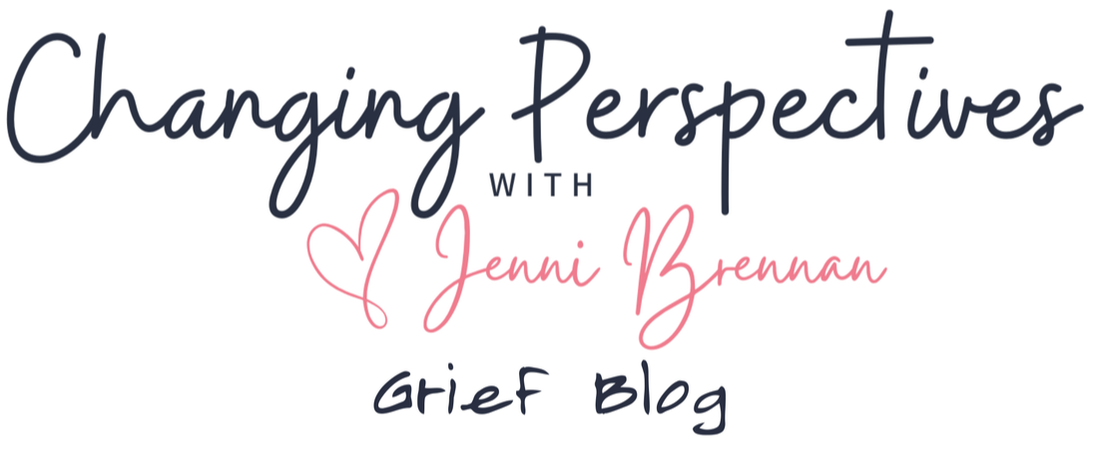
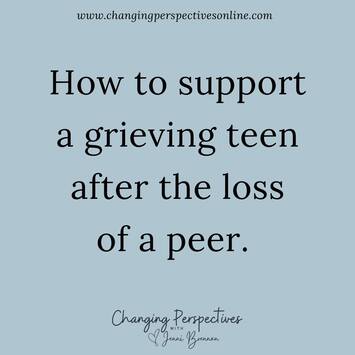

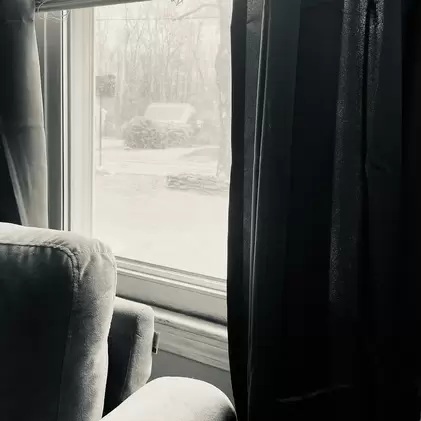



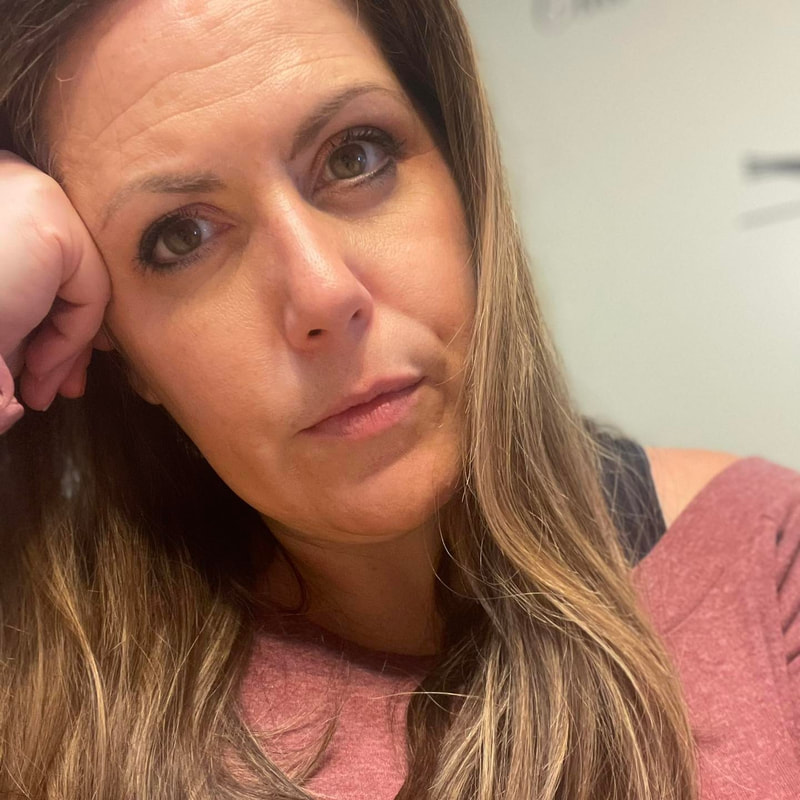

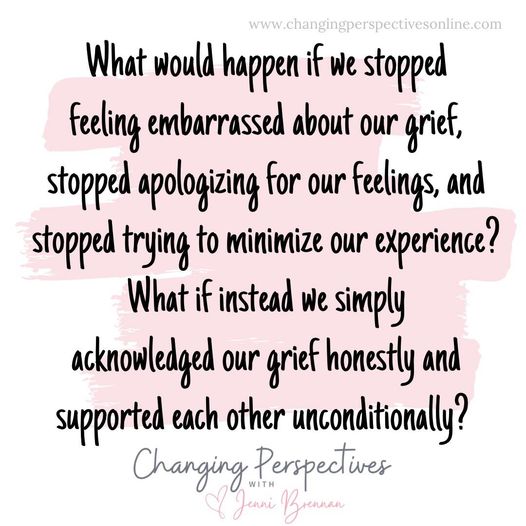
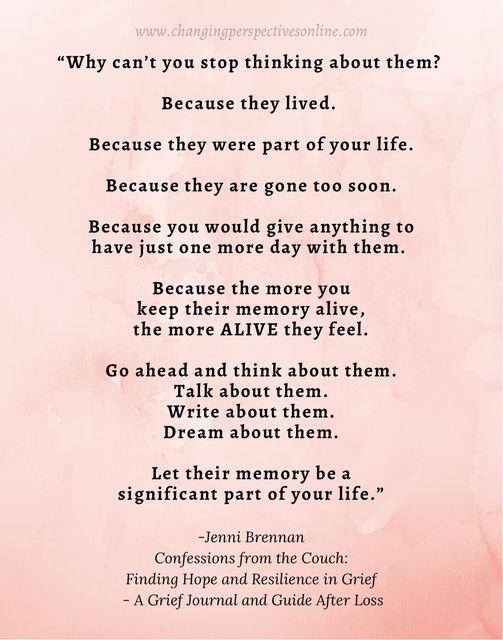
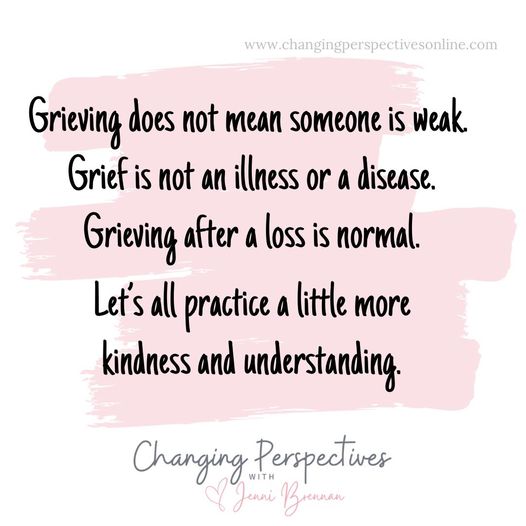
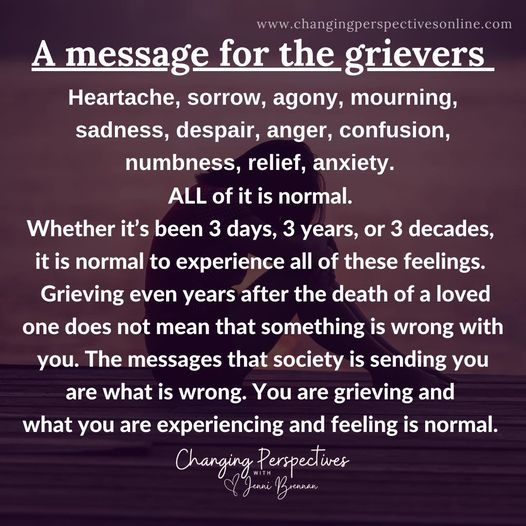
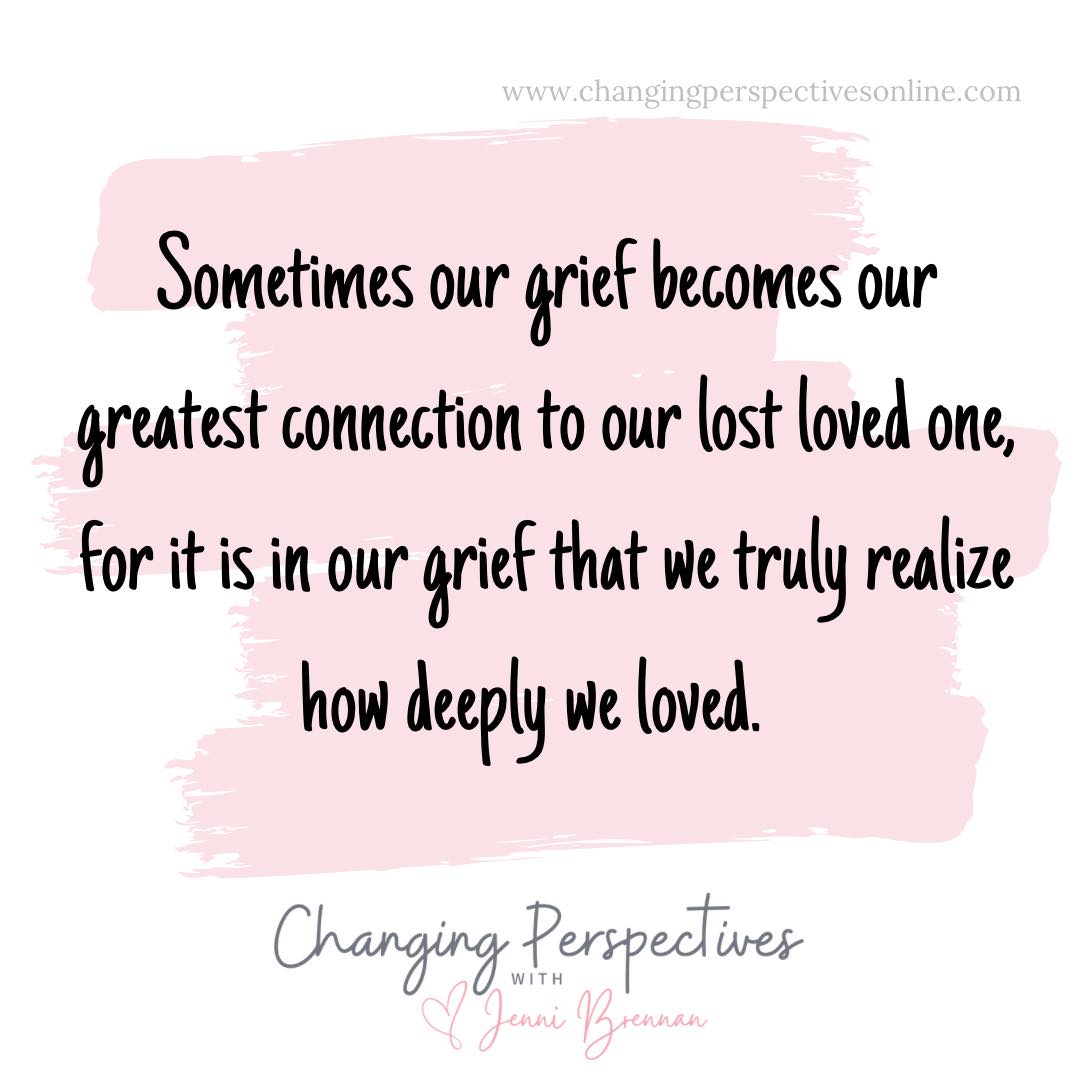

 RSS Feed
RSS Feed
